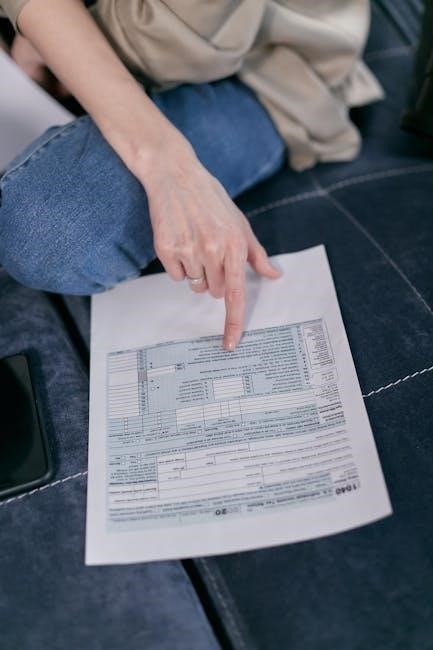Form 5472 is an informational return required for certain U․S․ corporations with foreign ownership‚ ensuring compliance with IRS regulations․ It reports transactions under sections 6038A and 6038C‚ aiding in accurate tax compliance and avoiding penalties․
Overview of Form 5472 and Its Purpose
Form 5472 is an informational return required for U․S․ corporations with foreign ownership‚ ensuring transparency in reportable transactions․ It captures details like rents‚ royalties‚ and capital contributions‚ aiding the IRS in monitoring compliance with tax laws․ Accurate reporting is crucial to avoid penalties and ensure adherence to regulatory requirements‚ fostering accountability in international business dealings․
Importance of Accurate Filing
Accurate filing of Form 5472 is critical to avoid penalties and ensure compliance with IRS regulations․ Incomplete or late submissions can result in fines‚ potentially up to $25‚000 annually․ Proper documentation and timely submission help maintain transparency and prevent legal complications‚ ensuring smooth operations for foreign-owned U․S․ corporations engaged in international transactions․
Eligibility Criteria for Filing Form 5472
U․S․ corporations with 25% or more foreign ownership must file Form 5472 to report certain transactions‚ ensuring compliance with IRS regulations for foreign-owned entities․
Corporations Required to File Form 5472
Corporations Required to File Form 5472
U․S․ corporations with 25% or more foreign ownership are required to file Form 5472․ This includes foreign-owned domestic corporations and certain LLCs classified as corporations for tax purposes․ The form is mandatory for entities engaged in U․S․ trade or business with reportable transactions‚ regardless of whether they owe U․S․ taxes․ Compliance is essential to avoid penalties and ensure accurate reporting of foreign ownership and transactions․
Thresholds for Foreign Ownership and Transactions
Corporations must file Form 5472 if foreign ownership exceeds 25%‚ either directly or indirectly․ Reportable transactions include rents‚ royalties‚ and certain payments between related parties․ The threshold for reporting these transactions is met if they involve a foreign or domestic related party․ Failure to meet these thresholds may result in penalties‚ emphasizing the importance of accurate compliance with IRS guidelines․

Gathering Necessary Information for Form 5472
Collect corporate details‚ foreign shareholder information‚ and documentation of reportable transactions․ Ensure accurate identification numbers and addresses are included to avoid filing delays or penalties․
Required Corporate Identification Details
Provide the corporation’s name‚ address‚ and Employer Identification Number (EIN)․ Include the tax year and any additional identifying details․ Ensure accuracy to prevent delays or penalties․ This information is crucial for proper filing and compliance with IRS regulations․
Documentation of Reportable Transactions
Document all reportable transactions with foreign or domestic related parties‚ such as sales‚ rents‚ royalties‚ and loans․ Include transaction type‚ amount‚ and details of involved parties․ Maintain accurate records to ensure compliance with IRS requirements and avoid penalties․ Proper documentation supports compliance with sections 6038A and 6038C‚ ensuring transparency in reporting․
Foreign Shareholder and Party Information
Provide detailed information about foreign shareholders‚ including their names‚ addresses‚ and Employer Identification Numbers (EINs)․ Report ownership percentages and transactions with related foreign or domestic parties․ Accurate identification of foreign entities ensures compliance with IRS reporting requirements and avoids potential penalties․ This section is critical for transparency in international business dealings and tax accountability․ Proper documentation is essential for all foreign-related transactions․
Filing Requirements and Deadlines
Form 5472 must be filed annually by April 15th to avoid a $25‚000 penalty․ Timely submission ensures compliance with IRS regulations and prevents late filing consequences․
Annual Filing Deadline for Form 5472
Form 5472 must be filed annually by April 15th to avoid penalties․ The deadline ensures timely reporting of transactions with foreign entities․ Late submissions result in a $25‚000 penalty‚ emphasizing the importance of meeting this deadline․ Foreign-owned U․S․ corporations and Single-Member LLCs must adhere to this schedule to maintain compliance with IRS regulations․
Consequences of Late or Incomplete Filing
Late or incomplete filing of Form 5472 can result in a $25‚000 penalty․ Additional penalties may apply if the form remains unfiled or incorrect․ Failure to comply can lead to further IRS actions‚ including audits or legal proceedings․ Timely and accurate filing is crucial to avoid financial and legal repercussions․

Preparing and Completing Form 5472
Form 5472 requires detailed corporate information‚ transaction documentation‚ and foreign shareholder details․ Ensure all sections are accurately filled to avoid errors and penalties‚ following IRS guidelines closely․
Step-by-Step Guide to Filling Out the Form
Start by entering the corporation’s name‚ address‚ and EIN․ Identify the tax year and specify if it’s an initial or final return․ Detail reportable transactions‚ including type‚ amounts‚ and counterparty information․ Disclose foreign shareholder details and related-party transactions․ Ensure accuracy in all sections‚ as errors can lead to penalties․ Review and sign the form before submission to confirm compliance with IRS requirements․
Understanding Each Section of the Form
Form 5472 is divided into three main parts․ Part I details reportable transactions‚ such as sales‚ rents‚ and royalties‚ with foreign entities․ Part II focuses on foreign shareholder information‚ including ownership percentages․ Part III covers additional reporting for transactions with foreign-related parties․ Each section requires precise details‚ ensuring compliance with IRS regulations and avoiding penalties for incomplete submissions․

Submission Methods for Form 5472
Form 5472 can be submitted electronically or by mail․ Electronic filing is efficient‚ while paper filings must be sent to the IRS address listed for your location․ No fax option is available․
Electronic Filing Options
Form 5472 can be e-filed through the IRS Modernized e-File (MeF) system‚ offering a secure and efficient method․ Filers can attach it to their tax return or submit it separately․ Electronic filing reduces errors and expedites processing․ Ensure the form is completed accurately before submission․ Visit the IRS website for detailed e-filing instructions and requirements․
Mailing Instructions for Paper Filings
For paper filings‚ Form 5472 must be mailed to the appropriate IRS address․ Include the form with your tax return or separately if required․ Ensure correct postage and verify the mailing address on the IRS website․ Proper mailing ensures timely processing and avoids delays or penalties․ Always retain a copy for records․
Record-Keeping and Compliance
Maintaining accurate records is crucial for compliance․ Keep all supporting documents for Form 5472 for at least three years․ Proper record-keeping ensures audit preparedness and avoids penalties․
Maintaining Supporting Documentation
Accurate record-keeping is essential for compliance with Form 5472․ Maintain detailed documentation of all reportable transactions‚ including dates‚ amounts‚ and parties involved․ This documentation must be retained for at least three years and made available upon IRS request to support the information reported on the form and ensure audit preparedness‚ avoiding potential penalties for incomplete filings․
Retention Period for Filed Forms and Records
Filed Forms 5472 and supporting records must be retained for at least three years from the filing deadline or the date of filing‚ whichever is later․ This ensures audit preparedness and compliance with IRS requirements․ Failure to maintain records may result in penalties‚ emphasizing the importance of organized and accessible documentation throughout the retention period․

Common Mistakes to Avoid
Common errors include missing deadlines‚ incomplete information‚ and incorrect reporting of transactions․ Ensure accurate details and timely submissions to prevent penalties and ensure compliance with IRS requirements․
Typical Errors in Form 5472 Submissions
Common errors include transposition mistakes in numerical data‚ incomplete or incorrect reporting of transactions‚ and failure to provide required corporate identification details․ Ensure all foreign shareholder information and transaction specifics are accurate․ Missing deadlines or omitting necessary documentation can lead to penalties․ Double-check each section for accuracy to avoid compliance issues and ensure timely submissions․
Best Practices for Accurate Compliance
Adhere to IRS guidelines strictly‚ ensuring all reportable transactions are documented accurately․ Verify corporate identification details and foreign shareholder information for completeness․ Utilize electronic filing for efficiency and confirmation of receipt․ Maintain detailed records for the required retention period to support compliance․ Consulting professionals for complex filings can prevent errors and ensure adherence to all regulatory standards effectively․
Additional Resources and Support
Visit the official IRS website for Form 5472 instructions and updates․ Refer to IRS Publication 519 and 901 for additional guidance․ Consult tax professionals for complex filings and personalized assistance․
Official IRS Guidelines and Updates
Visit the IRS website for the most accurate and up-to-date instructions for Form 5472․ The official guidelines provide detailed information on filing requirements‚ reportable transactions‚ and compliance under sections 6038A and 6038C․ Regularly check for updates to ensure adherence to the latest regulatory changes and avoid penalties․ The IRS also offers related forms and resources to assist with proper filing․
Professional Assistance for Complex Filings
For complex filings‚ consider hiring a tax professional or legal expert specializing in international tax law․ They can guide you through Form 5472 requirements‚ especially for foreign-owned corporations or multiple shareholders․ Their expertise ensures compliance‚ avoiding penalties and errors․ Professional assistance is crucial for interpreting IRS guidelines‚ managing reportable transactions‚ and navigating nuanced legal requirements․



